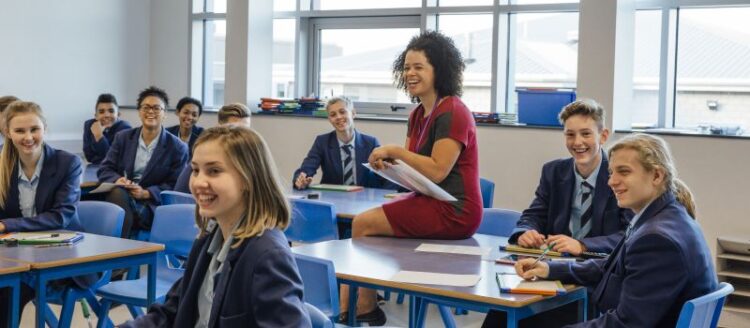By Gabriel Princewill-
The pandemic can no longer be used as a legitimate excuse for the stunting of children’s communication and language development, thirteen months after schools have returned to normality.
This is the conclusion of experienced academic, John Hoploop, who insists that Ofsted’s latest report about the effect of the pandemic on pupils is not necessarily accurate.
Last week, Ofsted published a report making observations of its findings from a sample of some 280 schools in Britain. One of the observations that resonated with the British public was the effects of very young children becoming accustomed to seeing face masks on adults most of the time.
An interesting observation reported by Ofsted’s research was the existence of gaps in pupils’ knowledge, particularly in mathematics, phonics and writing stamina.
However, Hopwood points out that a regression in writing stamina for teenagers cannot be incontrovertibly attributable to lockdown times, to the exclusion of other potential contributing factors.
The downside to some of Ofsted’s report on the effect of the pandemic on school pupils, is that ”the watchdog has provided no framework to demonstrate how they arrived at many of the conclusions they report”, Hopwood stated.
‘The assertion that the pandemic is the cause of the stated regression in maths, phonics and writing stamina in children is debatable. Other potential causative elements could arguably be responsible for the observed outcomes highlighted by Ofcom, Hoploop states.
‘Relative slow progress can be caused by other factors, and the conclusions of the education watchdog which does not have an impeccable record in substantiating all its findings, cannot be assumed to be wholesome. It was not long ago that the watchdog ignored criticisms of factual inaccuracies in one of its report about Ampleforth College, so it does not make sense to take its word for it in every respect”, he added.
Whilst the findings of Ofsted may apply to young primary school pupils who were left without adequate supervision during the lockdown, there is no demonstrable basis for applying the conclusions of Ofsted’s findings broadly.
The feeling among academic experts in many quarters is that the stated drawbacks of the pandemic on school children cannot be deemed tenable when applied to serious pupils over a year later. ‘The world has moved on, leaving the duty on pupils and their parents to make the necessary amends to catch up with lost times. The reality is that some children simply are not interested in learning, and don’t have the support network to positively encourage them’, Hopwood states.
Schools in the Uk finally re-opened in March 2021, after back and forth closures due to the pandemic. Over 1 billion students have been out of school as a result of similar national school closures across 134 countries over the past year.
School support for children during the pandemic have varied widely, with some children proactively supported and pushed whilst at home, and others left to their own unproductive devices. Most pupils were assigned homework to do and submit on a daily basis; some complying, others not. Assistance in many cases were provided by parents or hired tutors, in other cases, pupils were driven on their own to complete their work.
Though individual cases vary, all children have access to library resources.
‘Much of a child’s success in secondary school hinges on personal motivation , parental encouragement, and the quality of the academic environment in their respective schools, Hopwood states.
Academic: Joshua Hopwood
In the absence of hostile and tumultuous home environments, or complex mental health issues, children who are normally inclined to succeed in school are unlikely to have been overly hampered by the lockdown periods which the country have generally progressed from since the return to everyday life last year.
‘Comprehensive research suggests that children who are driven academically would continue to make strides in their studies; many of them motivated by the successes of their family members or the positive learning environment of their school. Some children are simply not motivated to be academically serious for various reasons’ Hoopwood states.
Pandemic Effects
The pandemic itself produced two types of children. Those who were sufficiently motivated to continue to study at home, and those who were not. Children in the vast majority of schools were assigned work to do at home, though some parents sought short cuts in getting tutors to assist them with the work without the child learning much themselves.
Tutor groups told this publication that there are a number of children who were simply unco-operative when it comes to following instructions given to them by tutors. These students are equally disruptive in class and likely to respond slowly to academic development, with or without the pandemic.
Reports of delays in speech and language of very young children are possible, but more detailed information embodying comparative assessment of delays is necessary to establish the potential implication of these delays.
Reports communicated by Ofsted’s researchers that babies have struggled to respond to basic facial expressions potentially due to reduced social interaction during the pandemic are concerning, but may be overcome with time.
Amanda Spielman, Ofsted’s chief inspector, said the worst affected were the most vulnerable children, with those living in smaller homes without gardens typically spending more time on screens during successive lockdowns, which also resulted in delays in learning to walk and crawl.
She said it was clear from four briefings on education recovery published by Ofsted that the pandemic had created “lingering challenges”.
She said: “I’m particularly worried about younger children’s development, which, if left unaddressed, could potentially cause problems for primary schools down the line.”




